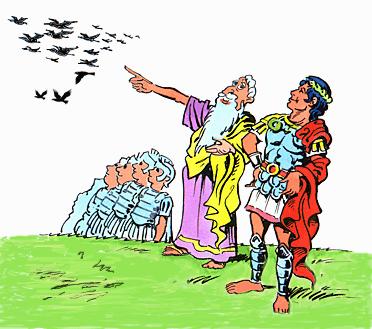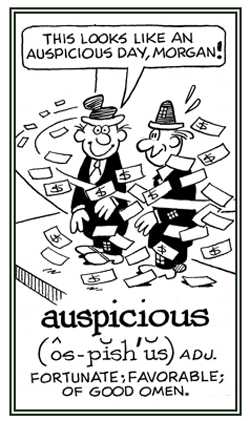2. Attended by favorable circumstances; propitious: Since the company was making so much money, it seemed to be an auspicious time for Mike to ask for a raise in salary, especially since he was one of the most successful salesmen.
3. Refering to something that promises success; propitious; opportune; favorable: It was an auspicious occasion when Mark's and Mary's twins were born in two separate years. The first one was born one minute before midnight in 2013 and the other one was born one minute after midnight in 2014.
4. Concerning something favored by good fortune and prosperity: Because of her beautiful and unique art work, Madeline experienced more auspicious sales than she had ever experienced before.
5. Descriptive of a good omen or prophetic sign indicating, or suggesting, that future success is possible: It was an auspicious time for Randy's uncle to start his new business because there was a significant demand for the products he was producing.

Favorable omens came to be known as auspicious while unfavorable signs were considered inauspicious.
In Roman times, an "augur" was a person who foretold the future by observing the birds flying in the sky. "Auspicium" became a divination (fortune telling) which involved watching the birds as they were soaring in the air and came from "auspex", someone who interprets signs from the movements of birds.A Latin derivative was the verb "inaugurare", to foretell the future from the flight of birds, which was applied to the installation of someone in office after the appropriate omens, or predictions, had been determined.
By the time "inaugurare" reached English, as "inaugurate", the association with the divination of birds had been forgotten.
An ancient Roman priest, or "auspex", was appointed to foretell or to divine the future outcome of an important event by observing how the birds were passing around, listening to their songs, observing the food they ate and sometimes by examining their internal organs.
Later the Roman "auspex" was replaced with the term "augur" as the interpreter-observer of bird signs; his name being derived from the Latin avis, "bird", and garrire, "to talk" or "to explain".
The augur's interpretation, or "augurism", became the English word "augury", an omen (prophecy, prediction), and the Latin "inaugurare", to install an official after consulting the birds, became the word we use to install politicians in office with the hope that their inaugurations will prove to be auspicious instead of consisting of political plots, schemes, and intrigues.


